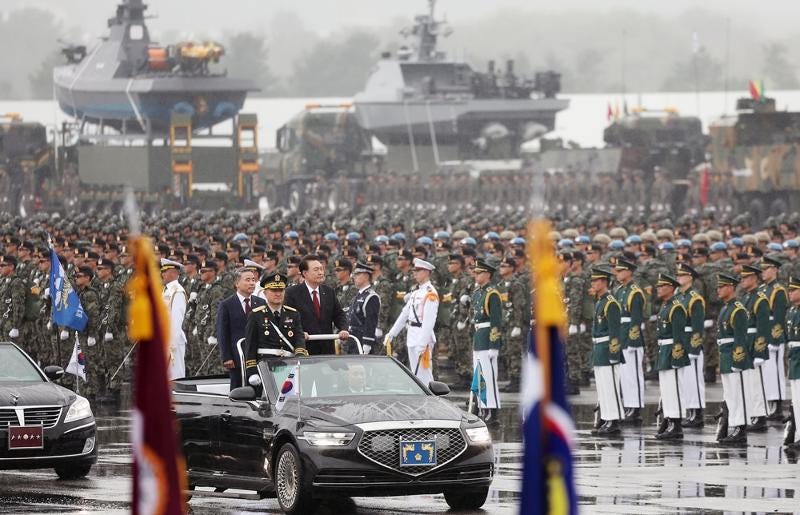Analysis: Seoul's Armed Forces Day military parade
A military parade to celebrate Armed Forces Day and promote a booming industry
Event or Trend: In celebration of Armed Forces Day, the South Korean government will host a large-scale military parade in Seoul on 1 October 2024.
Significance: This military parade marks the 76th Armed Forces Day. Its significance comes from the immediate impact on the Seoul metropolitan region, the potential response of North Korea, and the broader trend of militarization under the Yoon Seok-yul Administration as tensions on the Korean Peninsula heighten.
The event symbolizes South Korea's increasing assertiveness in showcasing its military strength as a deterrent, not only to North Korea but also as part of its response to China’s growing influence. It comes as South Korea strengthens its alliance with the United States and Japan, and increases military cooperation with NATO, Canada, Australia and the Philippines.
Governments and businesses need to monitor the impact of the event closely, as it signals possible shifts in defense postures and regional diplomatic dynamics.
Analysis: The military parade planned for October 1st, 2024, in Seoul underscores the evolving security environment on the Korean Peninsula and in East Asia.
Domestic and regional implications: South Korea’s decision to again host a large military parade after a decade’s absence can be interpreted broadly as a response to North Korea’s continued missile tests and nuclear development. The event will showcase advanced weaponry, including ballistic missiles and the domestically produced KF-21 fighter jets, signaling South Korea's growing military capabilities. This show of force is ostensibly intended to reassure its citizens and neighboring allies, notably the United States and Japan, of its commitment to national defense. However, such a display also risks further escalating tensions with North Korea, which views these military parades as provocations, potentially leading to further missile tests or military displays from Pyongyang.
Impact on Inter-Korean Relations: The parade complicates efforts at peace building between the two Koreas. Despite the historical significance of Armed Forces Day, such grand military displays can strain diplomatic channels. North Korea perceives the parade as a direct threat, reinforcing its narrative of U.S. influence over South Korea, and the Yoon Administration’s hostility. The militarization of both Koreas has led to a cycle of military build-up and aggressive rhetoric. Consequently, hopes for dialogue or détente appear bleak, with North Korea likely to intensify its weapons programs and further isolate itself from international negotiations.
U.S. and allied engagement: The parade is a clear demonstration of the deepening U.S.-South Korea-Japan military collaboration. Recent trilateral summits have focused on strengthening defense ties, and this event is likely to be viewed as a reaffirmation of these commitments. For South Korea, the parade is not only a display of domestic military power but also a message of solidarity with its allies. The involvement of U.S. military assets will highlight the ongoing defense cooperation aimed at countering both North Korean and Chinese threats.
Broader industry showcase: There are broader tensions across the globe with China’s assertiveness, Russia’s war in Ukraine, and Iran/Israel competition in the Middle East. The parade thus serves as a microcosm of the larger security dynamics playing out across the globe and reinforces the view that the maintenance of a strong military remains paramount. This serves South Korea’s interests as a major arms exporter that has attracted substantial global interest as a reliable supplier.
Outlook: In the short term (0-12 months), the military parade is expected to heighten tensions with North Korea, potentially leading to more missile tests and further military provocations. In the medium term (1-5 years), the decision to sustain annual military parades will rest with the next presidential administration. Regional militarization is expected to persist. South Korea’s military parades, coinciding with arms industry conferences and joint training, will likely play a more prominent role in the promotion of the country’s booming arms export industry.
Image: Korea.net “President Yoon attends 75th Armed Forces Day event” 28 September 2023.



